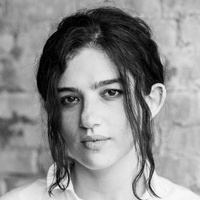As told to Madeline Howard, 2230 words.
Tags: Film, Education, Collaboration, Identity, Beginnings, Success, Money, Promotion.
On carving out space for yourself
Director and screenwriter Emma Seligman on the collaborative nature of directing, working with your contemporaries, and not letting the fear of rejection stop you.How does your creative process work differently when you’re writing a film versus when you’re directing a film?
The main difference is the collaborative part. When I’m writing, it’s much more insular. It’s much more private. It allows for more experimentation. There’s less stakes, because it’s just me. When I’m directing, it’s a very different kind of process, especially in the preparation months leading up to shooting. I’m usually with my cinematographer because that’s when I feel like I’m really combining my forces with hers, letting myself get excited in a way that’s different.
Whenever I collaborate with a really wonderful artist, it allows me to see the movie from another perspective. When it comes to movies, especially when you’re writing and directing, it can feel like magic when you feel someone else completes a portion of your vision. The movie starts to feel and look real in my head. It helps amplify and pull something out from your brain that you didn’t know was there. It’s inspiring when you find someone who so perfectly aligns with your instincts, and it makes me believe in the magic of movies and creative collaboration in general.
You went to one of the most well-known film programs in the United States, New York University’s Tisch School of the Arts. Would you say film school is the best path for people who want to direct? What are the benefits and drawbacks of film school?
I’ve always believed that film school is like a fast track to getting to where you want to be in your creative and professional pursuits. The most important thing you get out of film school, in my opinion, are the other students that you meet who are hungry to produce, direct, write, costume design, production design, and do cinematography on lower budget, short-form projects. They are willing to put in the energy and time for creating something that doesn’t have much reward in the near future, but shows that they believe in their peers.
I was also lucky enough to have incredible professors who educated me on my craft. I don’t think that’s impossible to do on your own, but if you have other jobs or are studying something else, it takes longer. However, there are so many people I’ve met through the younger film community in New York who didn’t go to film school, but learned their way just from being on set all the time, being a production assistant, assisting in the camera department, or whatever.
You’re totally capable of learning this stuff on your own, it just takes longer and it’s much less accessible. It’s definitely a matter of class and privilege. I feel lucky that I had the right professors and didn’t lose my drive. I was determined to try to make the most out of it.
I know you made Shiva Baby and Bottoms with some of the people you met at NYU. Would you say the friendships you made with your peers were more important to your success than the connections you made with more experienced professionals while at school?
My connections with my peers ended up being so much more vital to my career progressing than connections to any bosses. I had a million internships, and none of them wanted to make my first movie. And I don’t know this for sure, but sometimes I question if that’s because they saw me as an intern, as someone getting their coffee and not as a filmmaker they wanted to work with. But some of those people wrote letters for my visa application because I’m Canadian, so I don’t want to say it was for nothing. I did a lot of script coverage and I listened in on conversations, so of course, I learned a lot, but I I don’t know if I gained much more than that.
I will say one of my bosses put in a recommendation for my short film for South by Southwest, and that was pivotal to my career. Maybe that one connection really did change everything. It is about who you know, to a certain degree. So everything I just said may be bullshit because of that really small gesture that might have changed the course of my career. But other than that very important act of kindness, I don’t know how much those vertical connections helped me.
I’m sure two things can be true here—that those connections both did and didn’t contribute to your progress. I know a lot of people comment on your youth, which is probably annoying. But I’m wondering what you think the benefits of youth are when making art and film? Did you ever feel your age was an inhibitor?
What I would like to see as a benefit of youth as a director, or any creative person, is much more energy, hunger, and drive to get something done. This isn’t the case for everyone, but also the fact that I didn’t have children, or a serious relationship, or a serious job, these things are more typical of young creatives, particularly in New York. I’d like to think that the energy of my youth was one of the reasons I could get through the process of making the first feature and a second, which are hard things to do on your body.
One other good thing, even though it is weird, is that people do bring up my age. Our culture has an obsession with youth, especially young women, and I think it worked to my advantage with promoting the movie, especially because the character in my first movie was young. It really bothered me that many journalists asked me questions about my personal life and my connection to the character when an older filmmaker, particularly an older male, might not get the same questions. But in a weird way, I think it helped [with promotion]. That’s not necessarily something I enjoy, but I do think it made a difference.
The major drawback is in terms of “grind culture,” as they’re calling it now. I think there’s an assumption that if you’re young, you’ll be able to handle hard work and the brute force and energy that it takes to make something as intense as a movie. My youth and energy were able to put me through my first movie, but the drawback is that you exhaust yourself under this false pretense that you’ll do fine because you’re young and it doesn’t matter. And maybe you end up aging yourself no matter what. Between my first and second movie, I feel creatively totally depleted and I don’t know when that creativity will come back to me. I truly feel physically and mentally exhausted and that feels like a huge drawback. This process has totally destroyed my body and that has not been creatively helpful.
Is there anything you do when you experience a creative block like this? How do you nourish your creative side when you’re not working?
I would love a hobby. I’ve been saying for months as I’ve been doing this movie, “Oh my god, my next movie, I need to have a hobby or something else happening in my life.” Because when all your eggs are in one basket, you’re fucked. When I was making my first movie, I was in the process of co-writing the project that I just did. I think it’s good to have more than one thing going on at once. Not too many, because I can’t multitask well. But I think it’s good to have two things going on, maybe three.
This sounds so vague, but I think the most important thing you can do is live a life and continue to see friends and family. Seeing other human beings and hearing their stories at the very least can keep you in the world. When you’re so deep in a creative project, especially if it’s kind of escapist and not grounded in reality, you can start to feel like that’s the only important thing in the world. You’re so deep in it that nothing else matters.
One of my collaborators and best friends, Rachel Sennott, who was in my first movie and I wrote my second movie with, is a Virgo. She is so regimented about her writing. That is helpful. There’s an idea that creativity just comes to you and you have to pursue it when an idea strikes. But if you’re like, “I’m going to write one scene per day, or one page per day,” and that’s the bare minimum of a goal you’re trying to accomplish, it can be great. When I’ve done that, I’ve found it to be incredibly helpful because sometimes you just need to start writing or doing your thing and see what happens. Just rewrite and go from there. Something will come when you give yourself the space to do it.
Who are your creative inspirations? What work do you go back to or draw from most? Who inspires you today in the writing and directing field?
On a reference level, who I’m pulling inspiration from totally changes depending on the project. But overall, I admire directors, or storytellers in general, who aren’t afraid to try different genres and styles. Or, people who level up in their career but are able to somehow maintain their artistry, which is really hard with the pressures of working for a studio and more people offering their opinions.
Directors like Denis Villeneuve for example, who’ve gone from making independent Canadian movies to Dune, and have been able to maintain their style. That’s most inspiring to me. Directors like the Cohen brothers, sometimes I forget that they’ve done so many genres. They inspire me a ton because they’ve done westerns and comedies and thrillers.
Then again, I also admire directors who are able to continue exploring the same subjects and make personal stories over and over again, successfully. I just saw Broker, and I feel like the themes [director Hirokazu Koreeda] explored in this movie are very similar to the themes he explored in his last movie, Shoplifters. It was just so cool to see him explore the exact same topic but in a different way, and it doesn’t feel like he’s doing the same thing. So my inspirations are all over the place.
How will you define success for yourself as a creative person? What are the rewards of your creative practices and what have they taught you about yourself?
It’s a question I’m really grappling with. I think it depends on the life you’re comfortable living. I look at a filmmaker like Sean Baker, who makes his movies for nothing, and then sells them for like a million dollars or whatever to pay his people back. Then, he directs commercials on the side to be able to have a livelihood. Certain ideas I have are really big, but I know they’ll kill me to make them, emotionally. If I continue to level up in size and scope, directing is already so hard that I don’t know if I can handle it. It looks really appealing right now to make less and be able to tell more truthful stories. Maintaining your thing and just making stories that connect with people, to me, that’s success.
You’ve spoken before about having to create a space for yourself in the directing world, essentially saying that no one is going to welcome you in and say, “Hey, we saw your shorts and want you to direct your first feature film with us.” How would you advise other creatives when it comes to carving their own space?
The main thing I would say is don’t be afraid of rejection. You can’t let it touch you—especially when it comes to money. I’ve seen certain young creative people be deterred by not getting a grant, or not getting into a lab, or not getting money when asking for it. I don’t have a problem with rejection. You have to keep rolling and not let it make you question your work. Don’t think small, but especially when it comes to making your first thing, think about what’s achievable and try to go after that.
Think about people you want to work with who can be your producers or your advocates. Think about who can connect you with the right people and who are equally or almost equally invested in the success of whatever it is you’re trying to say, whether it’s an actor, a co-writer, or an independent publisher. Don’t trust any big person who says they’re interested in making your work then doesn’t do anything about it. I don’t think it’s harmful to maintain connections with people who are more experienced than you, but no one’s going to be invested like other creative people who are also trying to prove themselves.
Emma Seligman Recommends:
Sleep—because I highly recommend finding sleep when you can
Friends and family—to keep you connected to reality
Two projects at once—so you don’t become too invested in one thing
Something mind-numbing—whether it’s Housewives, old sitcoms, or TikTok
Being patient with yourself—this is really cheesy, but you just can’t be so hard on yourself




